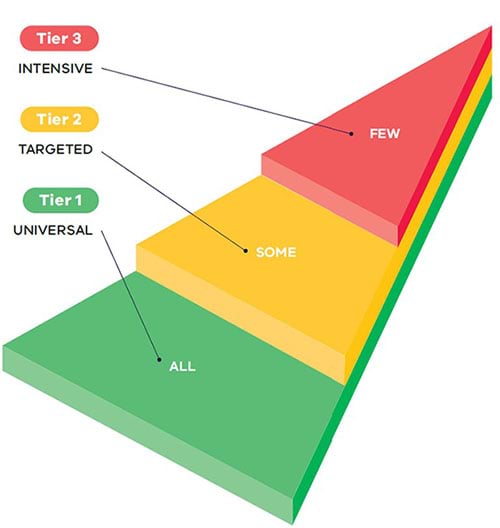What is SWPBS
School-wide Positive Behaviour Support (SWPBS) is a globally recognised, evidence-based framework that helps schools create safe, positive, and inclusive environments where students and staff can thrive.
SWPBS supports the Education State priorities and the Victorian Teaching and Learning Model 2.0 by helping schools build consistent, whole-school systems that promote positive behaviour, wellbeing, and inclusion—creating the right conditions for effective teaching, learning, and leadership across the school.
This document provides school leaders with an overview of SWPBS and practical guidance for its implementation.
- Information for schools (PDF, 3.5MB)(opens in a new window)
- Information for schools - accessible version (DOCX, 3.5MB)
This document outlines the 7 essential features a school commits to implementing as part of the SWPBS framework.
- Essential Features of SWPBS (PDF, 79KB)
- Essential Features of SWPBS - accessible version (DOCX, 142KB)
Features and benefits of SWPBS
SWPBS helps schools to:
- increase respectful and positive behaviour
- strengthen social and emotional wellbeing
- reduce classroom disruptions and increase learning time
- build positive, respectful relationships between students and staff
- create safe, orderly, and supportive school environments.
Schools implementing SWPBS:
- use inclusive, evidence-based strategies to support all students
- form teams to guide implementation and maintain momentum
- provide ongoing training and coaching to staff
- partner with students, families, and communities to ensure fairness and consistency
- use data to monitor progress and improve practices.
How SWPBS supports all students
SWPBS is built around four key elements
- Outcomes: Clear goals related to behaviour, wellbeing, academic success, and school climate
- Data: Evidence collected to monitor progress, identify needs, and guide decisions
- Practices: Teaching strategies and interventions to encourage positive behaviour
- Systems: Structures and processes that support consistent implementation, such as leadership teams and professional development
These elements are delivered through a multi-tiered system of support
- Tier 1: Universal Support – for all students, staff, and settings
- Tier 2: Targeted Support – for students at risk of behavioural challenges
- Tier 3: Intensive Support – for students with complex and individualised needs
SWPBS in Victoria
Since 2018, more than 700 Victorian government schools have participated in SWPBS.
Building on a $37.5 million investment since 2018, the Victorian Government has committed an additional $10.4 million over four years in the 2025–26 Budget.
Schools joining the SWPBS initiative receive the following supports:
- comprehensive professional learning for school leaders and teams
- individualised support from a specialist SWPBS coach
- annual assessment of implementation
- access to the Online Resources Hub
- eligibility to apply for annual SWPBS Awards.
Evaluation and outcomes
An external evaluation (November 2023) found a positive relationship between effective SWPBS implementation and improved school outcomes:
- Greater student connectedness, inclusion, and respect for diversity
- Improved classroom behaviour and reduced bullying
- More students reporting they feel supported by an adult at school
- Increased staff collaboration and confidence
- Fewer suspension days
Read the full evaluation of the Victorian SWPBS initiative (PPT, 3.5MB)
Case studies of SWPBS in action
Three case study videos provide insight into the practical benefits of School-wide Positive Behaviour Support (SWPBS) across different settings.
Each case aligns with the five FISO 2.0 core elements:
- teaching and learning
- engagement
- support and resources
- leadership
- assessment.
St Albans Heights Primary School
St. Albans Heights Primary School shares how implementing SWPBS transformed their school by teaching expected behaviours, building strong values, and creating a safer, more inclusive environment. Staff and students highlight the positive impact on safety, relationships, and learning.
Cranbourne Secondary College
Shows the role of clear expectations, encouragement, and strategic data use in improving behaviour and respect.
Cranbourne Secondary College shows how SWPBS has transformed their school through clear behaviour expectations, encouragement of positive interactions, and strategic use of data. This approach has created a safer, more respectful environment, improving behaviour and student success.
Yarra Ranges Special Development School
Yarra Ranges Special Development School uses SWPBS to help students with disabilities thrive. With clear expectations — be safe, responsible, and respectful — tiered supports, and tools like the MeTV program, the school fosters positive behaviour across all settings.
SWPBS acknowledgement awards
Participating schools are encouraged to apply for the annual acknowledgment awards, which highlight outstanding examples of SWPBS in primary, secondary and specialist schools. Awards are open to any school active in the initiative that meets the criteria.
To apply, schools submit detailed evidence of their implementation. Criteria are updated annually in Term 1 and listed below, along with the previous year’s award-winning schools.
- Award level criteria (PDF, 187KB): details of the award criteria and required evidence for each of the 4 levels.
- School achieving awards (XLSX, 30.8KB): a list of schools that achieved awards for their implementation in 2024.
Apply to join
Applications for the 2026 intake open in Term 3, 2025, and close on Friday 19 September 2025.
School leadership are invited to attend an online information session in early Term 3. The session provides an overview of the initiative and how to submit an application. Schools interested in attending can register for one of the three sessions below.
Register for one of the SWPBS information sessions (staff login is required):
- Tuesday 29 July 2025 3.45pm to 4.45pm
- Wednesday 6 August 2025, 3.45pm to 4.45pm
- Thursday 14 August 2025, 3.45pm to 4.45pm
- Wednesday 10 September 2025, 3.45pm to 4.45pm
To apply to join SWPBS, please complete the application form available on the Behaviour – Students resources page.
Schools joining SWPBS will commence implementation in Term 1, 2026. For further information or support please see contact details below.
Find out more
For further information about SWPBS, visit the Department’s Policy and Advisory Library behaviour page or contact the SWPBS central team:
- phone: 03 7022 1383
- email: positive.behaviour@education.vic.gov.au
Updated
